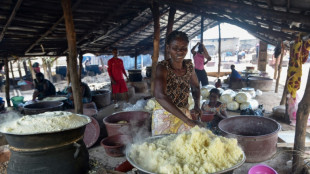
-
 Presidential vote seen as referendum on Romania's European future
Presidential vote seen as referendum on Romania's European future
-
Hamilton bids farewell to Mercedes as Ferrari vie for title

-
 New Zealand unchanged in bid to hit back against England
New Zealand unchanged in bid to hit back against England
-
Macron seeks remedy to France's political crisis

-
 New Natalia Lafourcade album celebrates music's onstage evolutions
New Natalia Lafourcade album celebrates music's onstage evolutions
-
Taiwan's Lai kicks off visit to US territory Guam

-
 Ivory Coast staple cassava meal gains UNESCO heritage status
Ivory Coast staple cassava meal gains UNESCO heritage status
-
OpenAI to partner with military defense tech company

-
 Liverpool held but Slot salutes 'special' Salah
Liverpool held but Slot salutes 'special' Salah
-
Man City needed to break losing 'routine', says Guardiola

-
 Leipzig down Frankfurt to reach German Cup quarters, Cologne strike late
Leipzig down Frankfurt to reach German Cup quarters, Cologne strike late
-
Mbappe admits penalty miss 'big mistake' as Bilbao beat Real Madrid

-
 'Sad, disappointed' Mbappe pays penalty as Bilbao beat Real Madrid
'Sad, disappointed' Mbappe pays penalty as Bilbao beat Real Madrid
-
US stocks surge to records, shrugging off upheaval in South Korea, France

-
 Liverpool held in Newcastle thriller, Arsenal inflict Amorim's first defeat
Liverpool held in Newcastle thriller, Arsenal inflict Amorim's first defeat
-
Shiffrin confirms she'll miss Beaver Creek World Cup races

-
 Corner kings Arsenal beat Man Utd to close gap on Liverpool
Corner kings Arsenal beat Man Utd to close gap on Liverpool
-
Mbappe pays penalty as Bilbao beat Real Madrid

-
 NFL Jaguars place Lawrence on injured reserve with concussion
NFL Jaguars place Lawrence on injured reserve with concussion
-
North Korea, Russia defence treaty comes into force

-
 Openda hits brace as Leipzig beat Frankfurt in German Cup last 16
Openda hits brace as Leipzig beat Frankfurt in German Cup last 16
-
Schar punishes Kelleher blunder as Newcastle hold Liverpool in thriller

-
 De Bruyne masterclass helps Man City end seven-game winless streak
De Bruyne masterclass helps Man City end seven-game winless streak
-
Syrian rebels surround Hama 'from three sides', monitor says

-
 Lawyers seek leniency for France rape trial defendants, blaming 'wolf' husband
Lawyers seek leniency for France rape trial defendants, blaming 'wolf' husband
-
OpenAI chief 'believes' Musk will not abuse government power

-
 Thousands rally in Georgia after police raid opposition offices
Thousands rally in Georgia after police raid opposition offices
-
S. Korea opposition push to impeach president

-
 Powell 'not concerned' US Fed would lose independence under Trump
Powell 'not concerned' US Fed would lose independence under Trump
-
French government falls in historic no-confidence vote

-
 Syrian White Helmets chief 'dreams' of never pulling a body out of rubble again
Syrian White Helmets chief 'dreams' of never pulling a body out of rubble again
-
NBA Suns lose Durant for at least a week with ankle injury

-
 Warhammer maker Games Workshop enters London's top stocks index
Warhammer maker Games Workshop enters London's top stocks index
-
Iran Nobel winner released for three weeks, 'unconditional' freedom urged

-
 Red Cross marks record numbers of humanitarians killed in 2024
Red Cross marks record numbers of humanitarians killed in 2024
-
Johnson's Grand Slam 'no threat', says World Athletics boss Coe

-
 Qatar's emir and UK's Starmer talk trade as state visit ends
Qatar's emir and UK's Starmer talk trade as state visit ends
-
Cuba suffers third nationwide blackout in two months

-
 Russia, Ukraine to send top diplomats to OSCE summit in Malta
Russia, Ukraine to send top diplomats to OSCE summit in Malta
-
Spanish royals to attend memorial service for flood victims

-
 LPGA, USGA new policy requires female at birth or pre-puberty change
LPGA, USGA new policy requires female at birth or pre-puberty change
-
Stick to current climate change laws, US tells top UN court

-
 British Museum chief says Marbles deal with Greece 'some distance' away
British Museum chief says Marbles deal with Greece 'some distance' away
-
Pope Francis receives electric popemobile from Mercedes

-
 Gaza civil defence: thousands flee Israeli strikes, evacuation calls
Gaza civil defence: thousands flee Israeli strikes, evacuation calls
-
Trump names billionaire private astronaut as next NASA chief

-
 Pidcock to leave INEOS Grenadiers at end of season
Pidcock to leave INEOS Grenadiers at end of season
-
Seoul stocks weaken, Paris advances despite political turmoil

-
 South America summit hopes to seal 'historic' trade deal with EU
South America summit hopes to seal 'historic' trade deal with EU
-
DAZN awarded global TV rights for Club World Cup


WHO says China's zero-Covid strategy unsustainable
China's flagship zero-Covid strategy to defeat the pandemic is unsustainable, the World Health Organization said Tuesday, adding that it had told Beijing so and called for a policy shift.
China has imposed draconian measures, trapping most of Shadnghai's 25 million people at home for weeks as the country combats its worst outbreak since the pandemic began.
The Shanghai lockdown has caused outrage and rare protest in the last major economy still glued to a zero-Covid policy, while movement in the capital Beijing has been slowly restricted.
"When we talk about the zero-Covid strategy, we don't think that it's sustainable, considering the behaviour of the virus now and what we anticipate in the future," WHO chief Tedros Adhanom Ghebreyesus told a press conference.
"We have discussed about this issue with Chinese experts and we indicated that the approach will not be sustainable.
"Transiting into another strategy will be very important."
There is a pressing political dynamic to China's virus response, with President Xi Jinping pegging the legitimacy of his leadership on protecting Chinese lives from Covid.
Xi has doubled down on the zero-Covid approach, despite mounting public frustration.
- Rights, society and economy -
Shanghai is China's economic dynamo and its biggest city. The zero-Covid policy has winded an economy which just months ago had been bouncing back from the pandemic.
"We need to balance the control measures against the impact they have on society, the impact they have on the economy, and that's not always an easy calibration," said WHO emergencies director Michael Ryan.
He said any measures to combat the Covid-19 pandemic should show "due respect to individual and human rights".
Calling for "dynamic, adjustable and agile policies", Ryan said early responses to the crisis in many countries showed that a lack of adaptability "resulted in a lot of harm".
He reflected on how the world's most populous nation had had relatively very few deaths officially ascribed to Covid, and therefore had "something to protect".
Given the rapid rise in deaths since February-March, "any government in that situation will take action to try and combat that", he told reporters.
Tedros has been discussing adjusting according to the circumstances to find an exit strategy, "in depth and in detail with Chinese colleagues", Ryan said.
Maria Van Kerkhove, the WHO's technical lead on Covid-19, said that worldwide, it was impossible to stop all transmission of the virus.
"Our goal, at a global level, is not to find all cases and stop all transmissions. It's really not possible at this present time," she said.
"But what we need to do is drive transmission down because the virus is circulating at such an intense level."
J.Fankhauser--BTB




